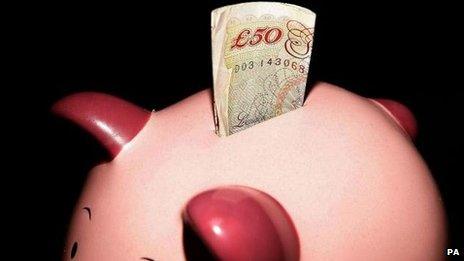Budget 2014: ISA savings accounts set for revamp
- Published

Millions of Britons will be able to save more money without having to pay tax, as a result of New Individual Savings Accounts (NISAs).
The chancellor announced that from 1 July 2014, investors will be able to put up to £15,000 into NISAs, either as cash or shares.
Currently savers can only invest £5,760 a year into a cash ISA.
Those investing in stocks and shares ISAs have a limit of £11,520 in the current tax year.
The government said that in total, more than six million savers would benefit from the changes.
Investors will now be able to transfer funds from previous ISAs - either cash or stocks and shares - into NISAs.
Those with stocks and shares ISAs will now be able to hold as much cash as they like within them, subject to the £15,000 annual limit, without penalty.
The announcement about NISAs was welcomed by the Halifax and the Nationwide Building Society.
NISAs will "reduce confusion on the differing amounts which could be saved in cash and stocks and shares, and more importantly give people more flexibility to earn tax-free interest", said Graham Beale, the chief executive of Nationwide.
Investors will also be able to make loans to peer-to-peer lenders within a NISA.
Those putting money into Junior ISAs and Child Trust Funds will be able to invest £4,000 a year, up from £3,720.
Premium Bonds
The chancellor also announced that the 10% tax rate on savings would be abolished, taking one million savers out of tax.
The rate applied on the first £2,790 of savings income above the personal allowance.
The Treasury also announced that the cap on savings in Premium Bonds will be raised, for the first time in over a decade.
From 1 June 2014, savers will be allowed to hold up to £40,000 in Premium Bonds, up from £30,000 previously, and in 2015 the limit will be raised further to £50,000.
The number of £1m Premium Bond prizes will be doubled each month to two, beginning with August's draw.
However, the total amount of prize money will not be extended, so fewer people will win prizes.
Those over 65 will also be able to buy new Pensioner Bonds, which, according to the chancellor, will "offer market-leading rates" from January 2015.
The exact savings rates will be announced in the autumn, but the Treasury estimates 2.8% a year on a one-year bond, and 4% on a three-year bond.
Personal allowances
In addition, hundreds of thousands more people will be exempt from income tax, as a result of the decision to increase the personal allowance.
As previously announced, in the 2014-15 tax year workers will be allowed to earn up to £10,000 before being liable for income tax.
From April 2015, workers will be allowed to earn up to £10,500 before having to pay tax.
The change should take a further 288,000 people out of the income tax bracket in 2015-16, according to the Treasury.
About 25 million taxpayers will benefit as a result, typically saving £100 a year each.
Including all the changes in personal allowance rates since 2010, basic rate taxpayers will have saved £805 a year by 2015, according to the government, while higher rate taxpayers will have saved £646 a year.
But there was no extra help for people paying the 40% rate of income tax. The threshold for the higher rate will rise by 1% in 2015, to £42,285, as expected.
The change in the personal allowance rate will also affect the transferable tax allowance for married couples.
The amount of income that one half of a married couple can transfer to their partner will be set at £1,050 for 2015-16.